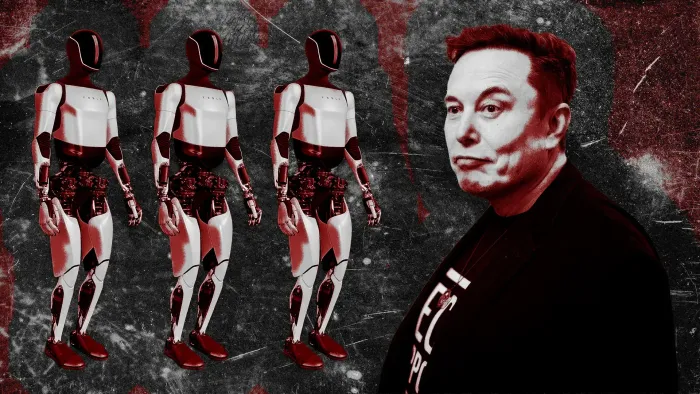
.
Image: Andrew Harnik/Getty Images, Tesla, Victor/Adobe Stock
On Wednesday, Tesla released its third-quarter earnings with a side of begging from CEO Elon Musk.
The report and subsequent investors’ call were pretty standard.
Tesla announced $28.1 billion in revenue, a 12% increase year-over-year (YOY) from $25.2 billion. A majority of Tesla’s revenue came, unsurprisingly, from automotive sales, which grew 6% YOY to $21.2 billion.
Quarter three was the last push for U.S. customers to buy Tesla vehicles before the federal EV tax credit expired.
However, it wasn’t enough. Tesla failed to meet Wall Street’s predicted $26.4 billion in total revenue, according to consensus estimates cited by CNBC. Its reported earnings per share also failed to make the mark, reaching 50 cents adjusted instead of the estimated 54 cents.
Tesla’s net income fell 37% YOY to $1.37 billion and its operating income dropped 40% to $1.6 billion. The company blamed the latter on greater operating expenses—due to “AI and other R&D projects”—along with increased deliveries and each vehicle costing more overall, thanks to factors like higher tariffs.
Tesla shares (Nasdaq:TSLA) were down roughly 4% in premarket trading on Thursday. The stock price is up 15.74% year to date, slightly underperforming the Nasdaq Composite’s growth of 17.94%.
AI was one of the main topics of conversation in Tesla’s earnings call, while Musk also focused on robotaxis and his plan for Optimus humanoid robots.
The call ended with a plea from Musk and CFO Vaibhav Taneja. On November 6, investors will vote on a $1 trillion compensation package for Musk—which would be contingent on the company hitting certain milestones.
Notably, the extra income would be in the form of Tesla shares, providing Musk with greater control over the company.
“[There] needs to be enough voting control to give a strong influence, but not so much that I can’t be fired if I go insane,” Musk said.
He then took aim at proxy firms Institutional Shareholder Services (ISS) and Glass Lewis, both of which are encouraging investors to vote against the new package.
“I just don’t feel comfortable building a robot army here and then being ousted because of some recommendations from ISS and Glass Lewis, who have no freaking clue,” Musk stated. “I mean, those guys are corporate terrorists.”
ABOUT THE AUTHOR
Sarah Fielding is an acclaimed journalist with seven years of experience covering mental health, social issues, and tech for publications such as Engadget, PS, the Washington Post, the New York Times, and Insider. She's also a cofounder of Empire Coven, a space highlighting trailblazing women across the United States.
